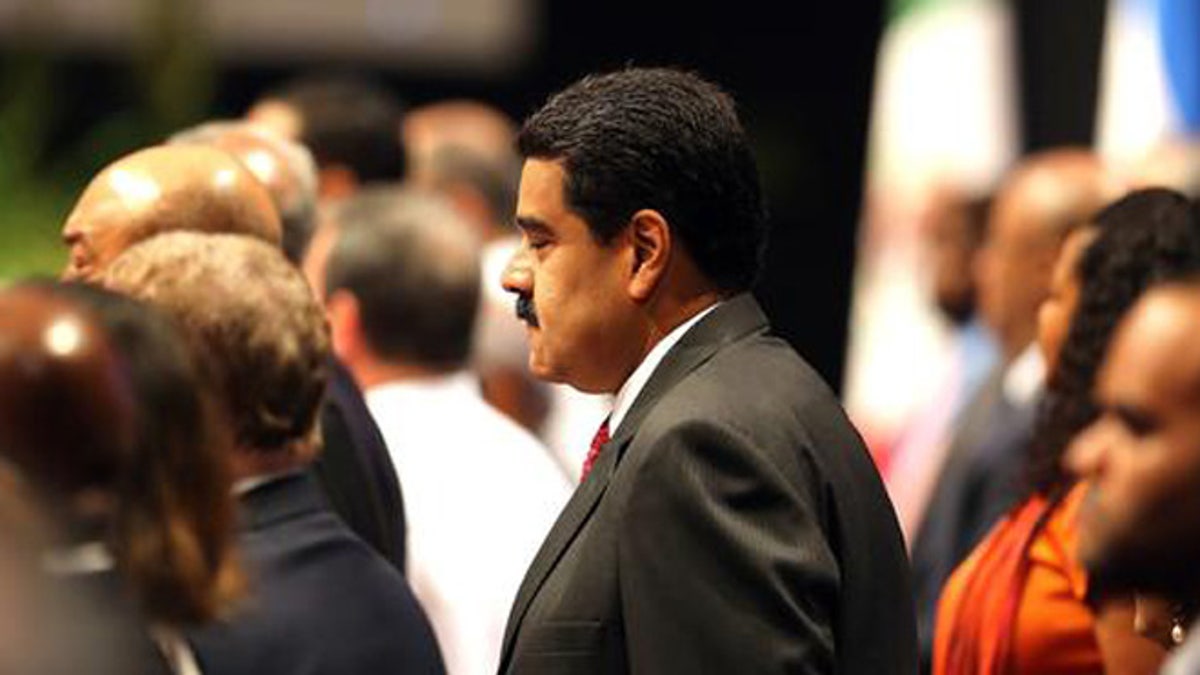
Venezuela's President Nicolas Maduro attends the 7th Summit of Heads of State by the Association of Caribbean States at Revolution Palace in Havana, Cuba, Saturday, June 4, 2016. (Alejandro Ernesto/Pool photo via AP)
Caracas, Venezuela – In the ongoing struggle between the Venezuelan government of President Nicolás Maduro and the opposition, which controls the Congress, the United States government keeps banking on dialogue, and it’s hoping to get a little help from the Organization of American States (OAS).
Earlier this week Secretary of State John Kerry met with Venezuela’s Foreign Minister Delcy Rodríguez, and he expressed the U.S.’s support for the negotiations being brokered by former Spanish Prime Minister José Luis Rodríguez Zapatero, Leonel Fernández – the former president of the Dominican Republic – and former Panamanian President Martín Torrijos.
But right now that dialogue is stalled.
The opposition, which has been pushing for a referendum allowing Venezuelans to recall Maduro, is refusing to meet with the government unless the electoral council, which is controlled by the Chavista government, schedules a vote.
According to the country’s constitution, new elections can only be called if the president has been in office less than four years — an anniversary Maduro will reach in 2017.
Not surprisingly, the government wants the recall vote to take place next year, which would mean that the ruling party would keep control of the presidency until 2019 even if Maduro lost.
But Secretary Kerry and the U.S. keep betting in favor of dialogue.
At Tuesday’s meeting, Kerry and Rodríguez agreed to open a direct line of dialogue between the U.S. and Venezuela in an effort to foster better ties between the countries.
Washington, D.C., and Caracas haven’t exchanged ambassadors since 2008, when the late President Hugo Chávez accused the U.S. of mounting a coup against his presidency.
The U.S. sees the dialogue “as an important means to bring together the government and opposition to establish common understandings that can resolve the crisis,” spokesman Mark Toner told reporters after the meeting.
But foreign policy analysts are not so hopeful.
“As long as the government keeps blocking the referendum and does not recognize the National Assembly, the possibility of a real dialogue is almost zero,” a high-ranking diplomat from a European country based in Venezuela told Fox News Latino, asking not to be identified for fear of damaging relationships with people in the Maduro regime.
Edgar Otalvora, a Venezuelan foreign policy expert and former diplomat, told FNL, “South American governments, the U.S. and the Vatican have all supported the dialogue, because no one really knows what to do about Venezuela’s situation. But, for now, this dialogue doesn’t have a future.”
In the face of this impasse, the opposition is trying to bring international support to pressure the government and force a referendum.
Governor Henrique Capriles, a two-time presidential candidate, traveled to Paraguay, Argentina and Brazil earlier this week to speak with presidents and foreign ministers about the situation.
A U.S. State Department spokesperson told Fox News Latino, “It is imperative that OAS member states work collectively and demonstrate the leadership necessary to address the erosion of democratic institutions in Venezuela.”
He added, “[The organization must] uphold our region’s commitment to act in concert in the defense of democracy and human rights in the Americas when they are imperiled. This is, in fact, the primary purpose of the OAS.”
Next Thursday, June 23, the OAS is holding a special session on Venezuela called by the organization’s General Secretary, Luis Almagro, who has exchanged barbed words with Maduro in recent weeks.
Henry Ramos Allup, the president of Venezuela’s National Assembly, is expected to speak at the meeting about the country’s crisis and how Maduro’s government has nullified the Congress’ legislative power.
Member nations are likely to vote that day on whether or not to invoke the Inter-American Democratic Charter against Venezuela, an action that could result in the suspension of the country from the OAS.
Meanwhile, the U.S. hopes there will be no further obstruction to the referendum.
“The Venezuelan constitution guarantees Venezuelans the right to have their voices heard through the referendum process,” the State Department spokesperson told FNL. “We call on Venezuelan authorities to allow this process to go forward, in accordance with the will of Venezuelan voters.”
